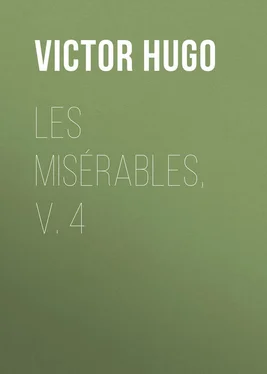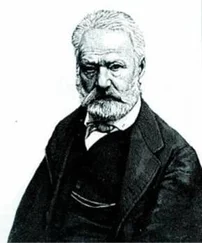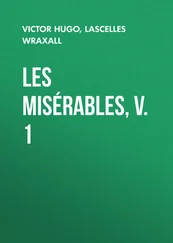Victor Hugo - Les Misérables, v. 4
Здесь есть возможность читать онлайн «Victor Hugo - Les Misérables, v. 4» — ознакомительный отрывок электронной книги совершенно бесплатно, а после прочтения отрывка купить полную версию. В некоторых случаях можно слушать аудио, скачать через торрент в формате fb2 и присутствует краткое содержание. Жанр: literature_19, foreign_antique, foreign_prose, на английском языке. Описание произведения, (предисловие) а так же отзывы посетителей доступны на портале библиотеки ЛибКат.
- Название:Les Misérables, v. 4
- Автор:
- Жанр:
- Год:неизвестен
- ISBN:нет данных
- Рейтинг книги:4 / 5. Голосов: 1
-
Избранное:Добавить в избранное
- Отзывы:
-
Ваша оценка:
- 80
- 1
- 2
- 3
- 4
- 5
Les Misérables, v. 4: краткое содержание, описание и аннотация
Предлагаем к чтению аннотацию, описание, краткое содержание или предисловие (зависит от того, что написал сам автор книги «Les Misérables, v. 4»). Если вы не нашли необходимую информацию о книге — напишите в комментариях, мы постараемся отыскать её.
Les Misérables, v. 4 — читать онлайн ознакомительный отрывок
Ниже представлен текст книги, разбитый по страницам. Система сохранения места последней прочитанной страницы, позволяет с удобством читать онлайн бесплатно книгу «Les Misérables, v. 4», без необходимости каждый раз заново искать на чём Вы остановились. Поставьте закладку, и сможете в любой момент перейти на страницу, на которой закончили чтение.
Интервал:
Закладка:
A mason, returning home after his day's work, left a small parcel on the bench near the bridge of Austerlitz. It was carried to the guard-house and opened, and from it were taken two printed dialogues signed "Lahautière," a song called "Workmen, combine!" and a tin box full of cartridges. A workman drinking with his comrade bade him feel how hot he was; and the other noticed a pistol under his jacket. In a ditch on the boulevard between Père Lachaise and the Barrière du Trône, some children, playing at the most deserted spot, discovered under a heap of rubbish a bag containing a bullet mould, a mandrel for making cartridges, a pouch in which there were some grains of gunpowder, and an iron ladle on which were evident signs of melted lead. Some police agents suddenly entering at five A.M. the room of one Pardon, who was at a later date a sectionist belonging to the Barricade Merry section, found him sitting on his bed with cartridges in his hand, which he was in the act of making. At the hour when workmen are generally resting, two men were noticed to meet between the Picpus and Charenton barrières, in a lane running between two walls. One took a pistol from under his blouse, which he handed to the other; as he gave it him he noticed that the perspiration on his chest had dampened the gunpowder, he therefore filled the pan afresh, and the two men thereupon parted. A man of the name of Gallas, afterwards killed in the April affair in the Rue Beaubourg, used to boast that he had at home seven hundred cartridges and twenty-four gun flints. One day the Government received information that arms and two hundred thousand cartridges had just been distributed in the faubourg, and the next week thirty thousand more cartridges were given out. The remarkable thing was that the police could not seize any of them; but an intercepted letter stated: "The day is not far distant when eighty thousand patriots will be under arms in four hours."
All this fermentation was public, we might almost say calm, and the impending insurrection prepared its storm quietly in the face of the Government. No singularity was lacking in this crisis, which was still subterranean, but already perceptible. The citizens spoke peacefully to the workmen of what was preparing. They said, "How is the revolt going on?" in the same tone as they could have said, "How is your wife?" A furniture broker in the Rue Moreau asked, "Well, when do you attack?" and another shop-keeper said, "They will attack soon, I know it. A month ago there were fifteen thousand of you, and now there are twenty-five thousand." He offered his gun, and a neighbor offered a pocket pistol which was marked for sale at seven francs. The revolutionary fever spread, and no point of Paris or of France escaped it. The artery throbbed everywhere, and the network of secret societies began spreading over the country like the membranes which spring up from certain inflammations, and are formed in the human body. From the Association of the Friends of the People, which was at the same time public and secret, sprang the Society of the Rights of Man, which dated one of its orders of the day, "Pluviose, year 40 of the republican era," which was destined even to survive the decrees of the Court of Assizes pronouncing its dissolution, and did not hesitate to give to its sections significant titles like the following: "Pikes. The Tocsin. The Alarm Gun. The Phrygian Cap. January 21. The Beggars. The Vagrants. March forward. Robespierre. The Level. Ça ira."
The Society of the Rights of Man engendered the Society of Action, composed of impatient men who detached themselves and hurried forward. Other associations tried to recruit themselves in the great mother societies: and the sectionists complained of being tormented. Such were the "Gaulish Society" and the "Organizing Committee of the Municipalities;" such the associations for the "Liberty of the Press," for "Individual Liberty," for the "Instruction of the People," and "Against Indirect Taxes." Next we have the Society of Equalitarian Workmen divided into three fractions, – the Equalitarians, the Communists, and the Reformers. Then, again, the Army of the Bastilles, a cohort possessing military organization, four men being commanded by a corporal, ten by a sergeant, twenty by a sub-lieutenant, and forty by a lieutenant; there were never more than five men who knew each other. This is a creation where precaution is combined with audacity, and which seems to be stamped with the genius of Venice. The central committee which formed the head, had two arms, – the Society of Action and the Army of the Bastilles. A legitimist association, the "Knights of Fidelity," agitated among these republican affiliations, but was denounced and repudiated. The Parisian societies ramified through the principal cities. Lyons, Nantes, Lille, and Marseilles, had their Society of the Rights of Man, The Charbonnière, and the Free Men. Aix had a revolutionary society called the Cougourde. We have already mentioned that name.
At Paris the Faubourg Marceau buzzed no less than the Faubourg St. Antoine, and the schools were quite as excited as the faubourgs. A coffee-shop in the Rue Saint Hyacinthe, and the Estaminet des Sept Billards in the Rue des Mathurins St. Jacques, served as the gathering-place for the students. The Society of the Friends of the A. B. C. affiliated with the Mutualists of Angers, and the Cougourde of Aix assembled, as we have seen, at the Café Musain. The same young men met, as we have also said, at a wine-shop and eating-house near the Rue Montdétour, called Corinthe. These meetings were secret, but others were as public as possible, and we may judge of their boldness by this fragment from an examination that was held in one of the ulterior trials. "Where was the meeting held?" "In the Rue de la Paix." "At whose house?" "In the street." "What sections were there?" "Only one." "Which one?" "The Manuel section." "Who was the chief?" "Myself." "You are too young to have yourself formed this serious resolve of attacking the Government. Whence came your instructions?" "From the central committee." The army was undermined at the same time as the population, as was proved at a later date by the movements of Béford, Luneville, and Épinal. Hopes were built on the 52d, 5th, 8th, and 37th regiments, and on the 20th light infantry. In Burgundy and the southern towns the tree of liberty was planted, that is to say, a mast surmounted by a red cap.
Such was the situation.
This situation, as we said at the commencement, the Faubourg St. Antoine rendered keen and marked more than any other group of the population. This was the stitch in the side. This old faubourg, peopled like an ant-heap, laborious, courageous, and passionate as a hive of bees, quivered in expectation and the desire of a commotion. All was agitation there, but labor was not suspended on that account. Nothing could give an idea of these sharp and sombre faces; there were in this faubourg crushing distress hidden under the roofs of houses, and also ardent and rare minds. It is especially in the case of distress and intelligence that it is dangerous for extremes to meet. The Faubourg St. Antoine had other causes for excitement, as it received the counter-stroke of commercial crisis, bankruptcies, stoppages, and cessation of work, which are inherent in all political convulsions. In revolutionary times misery is at once the cause and the effect, and the blow which it deals falls upon itself again. This population, full of haughty virtue, capable of the highest amount of latent caloric, ever ready to take up arms, prompt to explode, irritated, profound, and undermined, seemed to be only waiting for the fall of a spark. Whenever certain sparks float about the horizon, driven by the wind of events, we cannot help thinking of the Faubourg St. Antoine and the formidable chance which has placed at the gates of Paris this powder-magazine of sufferings and ideas.
Читать дальшеИнтервал:
Закладка:
Похожие книги на «Les Misérables, v. 4»
Представляем Вашему вниманию похожие книги на «Les Misérables, v. 4» списком для выбора. Мы отобрали схожую по названию и смыслу литературу в надежде предоставить читателям больше вариантов отыскать новые, интересные, ещё непрочитанные произведения.
Обсуждение, отзывы о книге «Les Misérables, v. 4» и просто собственные мнения читателей. Оставьте ваши комментарии, напишите, что Вы думаете о произведении, его смысле или главных героях. Укажите что конкретно понравилось, а что нет, и почему Вы так считаете.












